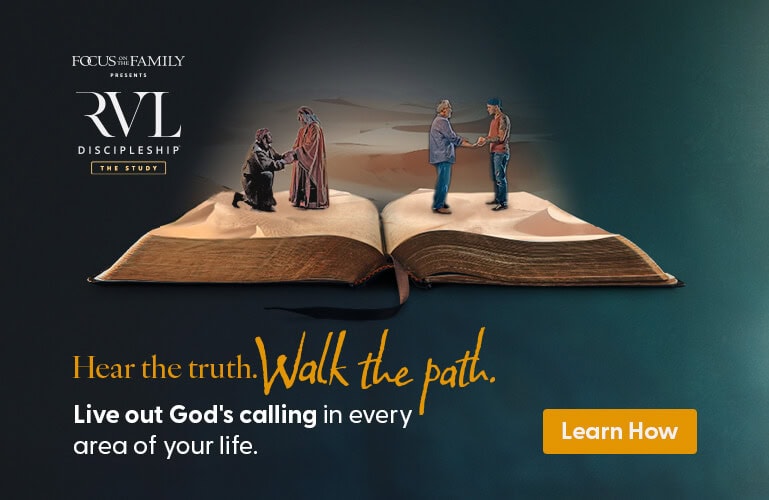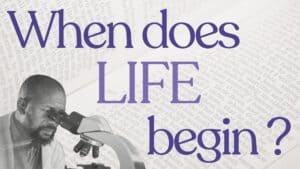My mother was rushed to the hospital in labor and seriously ill. Her doctor told Dad that the baby, their first, was already dead and that Mom might not survive.
And, just as he predicted, after delivery a nurse came out and confirmed that I was indeed dead. The doctor quickly tossed me aside in order to save my mother’s life. According to reliable witnesses, I was 20 minutes without breath. One attending nurse said that “something kept telling me to work with that baby.” She did, even though Doctor Black ordered her to “leave that dead baby alone and help me with Mrs. Chinn.”
Later, out in the waiting room, Dad heard a baby’s cry. Knowing that his son was dead, he assumed another baby had just been born. No one has ever offered a clear explanation for how I, reportedly dead for 20 minutes, came back to life.
For much of my life, Ephesians 2:1 has carried a deep resonance for me. “As for you, you were dead . . .” (NIV) I grew up with a powerful awareness that my life did not belong to me.
How Do You See Your Lifework?
Any brush with death tends to give “new eyes” for viewing life. Many people who have passed through car wrecks, wars, serious illness or major surgeries have come out the other end with radically changed views of life. And, most people cannot stand at the grave of loved ones without facing the big issues.
In such mortality moments, one’s lifework is one of the first issues to get reshuffled or redefined. After facing their own or a loved one’s death, many people have walked away from lucrative professions in order to serve the poor, the oppressed, young people, terminal patients, those who are spiritually lost or confused or even animals.
Our concept of “career” is a fairly recent invention and is generally understood as a self-defined and directed investment of one’s energies throughout the primary earning years. Webster’s 1828 Dictionary carries no mention of career as a profession or lifework. But, it does present a word which covers “vocation; profession; trade; usual occupation or employment.” That word is “calling.”
Consider the enormous chasm between “calling” and “career.” To view our profession or occupation as a calling suggests that Someone called us. Is it possible that the One who gave us life also gave us a purpose which predates and transcends our own life? Could that assignment be larger than me and my interests? What a soaring and majestic idea! I think that is a large part of what David contemplated in Psalm 8:
When I consider Thy heavens, the work of Thy fingers,
The moon and the stars, which Thou hast ordained;
What is man, that Thou dost take thought of him?
And the son of man, that Thou dost care for him?
Yet Thou hast made him a little lower than God,
And dost crown him with glory and majesty!
Thou dost make him to rule over the works of Thy hands;
Thou hast put all things under his feet… (NASB)
The same One who created the expanse of the universe also “calls” us to work beside Him in caring for His creation. If we really “see” that, it might blow our socks off our feet and our head off our shoulders.
Compared to that panoramic call, the idea of “career” is miniscule and claustrophobic! We can work beside the Creator and Ruler of the universe…or we can make a lot of money, become famous, retire at 46, travel and spend money and “Time Magazine” will print our obituary. Now, let’s see; which path should I take?
Our Pattern for Life on Earth
Why were you born?
That is probably the most compelling and relentless question in all of life. Through nothing that we did or deserved, we were each – literally – a one-in-a-million being. The odds of that sperm uniting with that egg were the longest shot “conceivable.” Finally, after nine months of incubated growth and development, we were each pushed through a wondrous and mysterious canal into life, then nurtured and raised into maturity.
Why?
As a Christian, I must look at the perfect Model of my faith – Jesus – for what to do with that question. He, too, was squeezed out of a human womb and grew up in much the same way as everyone else. So, how did He, our Master and Model, “see” and respond to the “Why?”
The more we know anything, the easier and simpler we can say it. And, He answered the great “why” question in seven one-syllable words: “I have come to do Thy will.” (Hebrews 10:9 NASB). That grand summary of His life on earth also applies to why every person was born and what they are to do with their time on earth.
Those who clearly “see” that issue may end up designing buildings or bridges, comforting the dying, inventing or refining new technologies, pastoring, creating wealth, writing songs, teaching, raising cattle, defending the powerless, farming the ground, enforcing laws or drilling for oil (others may do those same things, but from totally different motivations and objectives).
Some historical figures who seemed to connect with their calling were named Moses, Mary, Paul, Martin Luther, Martin Luther King, Churchill, Solzhenitsyn, Mother Teresa, and, sure, Peyton Manning (some would argue that Muhammad Ali also had a fine sense of calling: He said, “Grass grows, birds fly, waves pound the sand. I beat people up.”).
Lift Up Your Eyes
The great issue of “eyesight” is more a matter of whom – rather than how or what – we see. Our surrounding culture insists that we see ourselves at the expense of all others. That was the underlying premise of television series “Seinfeld.” Most Western cultures and countries are “Seinfeld Nation.” They teach people to promote themselves and their comforts and obsessions even at the loss of civilization and the future.
Narcissism – the almost-erotic scrutiny and indulgence of one’s personal comfort, appearance, preferences and pampering – constitutes the crisis of our times.
It cripples economies, governments, culture, education, health care, religion and every other area of life. Throughout most of history, adults knew that life was not about them. Today, most people gaze continually into their own reflection. And, they design careers for the purpose of magnifying their own reflection.
That kind of indulgence is as perverse as a snake swallowing its tail. Even a reasonable intelligence knows this cannot end well.
When the “Father of our faith,” Abraham, became overwhelmed with life on earth, God told him “life up your eyes and look…” (Genesis 13:14). In other words, the answer would never be found in Abraham or anything in his environment. He had to go back to the source of his “calling.” Up there.
In somewhat the same way, the author of Hebrews wrote that the only way to run the race assigned to us is to “fix our eyes upon Jesus, the author and perfecter of our faith.
Lifting up our eyes – away from ourselves and our own surroundings – is the only way to find a new way of seeing and fulfilling our purpose on earth.
Ed Chinn is an organizational consultant and freelance writer from Fort Worth, Texas (edchinn@mac.com). His work has appeared in the Christian Science Monitor, the Washington Post, OpinionJournal.com, and the Fort Worth Star Telegram.

















